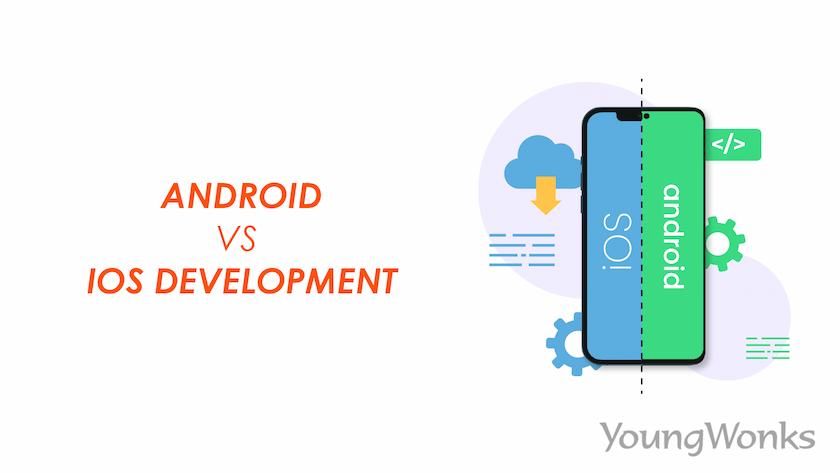May 13, 2024 By Team YoungWonks *
When embarking on a mobile app development journey, one of the initial dilemmas developers face is choosing between Android and iOS. Let's break down the characteristics of each platform to understand their strengths and weaknesses.
Android App Development
Android, developed by Google, boasts the largest market share in the global smartphone market. Its open-source nature allows for greater customization and flexibility in app development.
Here are some key points to consider:
- Market Share: Android holds the lion's share of the smartphone market worldwide, making it a lucrative platform for app developers aiming for a broad user base.
- Customization: The Android platform offers extensive customization options, allowing developers to tailor their apps to a wide range of devices with different screen sizes, resolutions, and hardware specifications.
- Development Tools: Android Studio, the official integrated development environment (IDE) for Android app development, provides a comprehensive suite of tools and resources for developers.
- Fragmentation: One of the significant challenges in Android development is fragmentation, wherein the platform exists in various versions across different devices. This can lead to compatibility issues and additional testing efforts.
iOS App Development
iOS, the operating system powering Apple devices like the iPhone and iPad, is known for its sleek design, high performance, and strong focus on user experience. Here's what you need to know about iOS development:
- User Base: While iOS commands a smaller market share compared to Android, it boasts a loyal and affluent user base, making it an attractive platform for monetization and premium app offerings.
- Uniformity: Unlike Android, iOS devices run on a limited number of hardware configurations, resulting in greater uniformity and easier compatibility testing for apps.
- Development Environment: Xcode, Apple's official IDE for iOS app development, provides robust tools and features, along with comprehensive documentation and support.
- App Store Approval Process: iOS apps undergo a stringent review process by Apple before they are made available on the App Store, ensuring a higher level of quality and security but potentially causing delays in app deployment. The App Store approval process involves a team of Apple reviewers meticulously evaluating each submitted app against a set of guidelines and standards. These guidelines cover various aspects, including app functionality, design, content, and compliance with Apple's policies and regulations. While this rigorous review process helps maintain the integrity and security of the App Store ecosystem, it can also result in delays in app approval, especially if the app requires additional clarification or modifications to meet Apple's requirements.
Best Platform for Mobile App Development
When it comes to determining the best platform for mobile app development, the answer largely depends on your specific goals, target audience, and project requirements. Both Android and iOS offer distinct advantages and cater to different user demographics. Android's open-source nature and widespread adoption make it an attractive choice for reaching a broad audience, particularly in emerging markets or among tech-savvy users who value customization and flexibility. On the other hand, iOS's closed ecosystem, renowned for its seamless user experience, premium hardware, and loyal user base, presents lucrative opportunities for monetization and premium app offerings. Ultimately, the best platform for mobile app development will depend on factors such as your target market, budget, development resources, and long-term strategic objectives. It's essential to carefully evaluate these factors and choose the platform that aligns most closely with your app's goals and audience preferences. By leveraging the unique strengths of each platform and adopting a strategic approach to development, you can maximize the success and impact of your mobile app venture.
Choosing the right platform for your mobile app is a pivotal decision that can significantly impact its success in the market. It requires careful evaluation of factors such as your target audience's preferences, geographical location, and device usage habits. Understanding the demographics and behaviors of Android and iOS users can help you determine which platform aligns best with your app's goals and user base. Additionally, consider the platform's development ecosystem, including available tools, resources, and community support, to ensure smooth development and maintenance processes. By conducting thorough market research, analyzing platform-specific features, and aligning your app strategy with your business objectives, you can make an informed decision and position your app for success on the platform that best serves your target audience's needs.
Android App Development Advantages
Android app development offers several advantages, including a vast user base, customizable user interfaces, and robust development tools. The open-source nature of the Android platform allows for greater flexibility and innovation, enabling developers to create diverse and feature-rich apps tailored to specific user needs. Furthermore, Android's fragmentation, often viewed as a challenge, also presents opportunities for reaching a broader audience by accommodating various devices with different specifications and screen sizes.
Benefits of Developing for iOS First
Developing for iOS first offers several benefits, particularly for startups and businesses aiming to establish a presence in the market quickly. The iOS ecosystem is renowned for its affluent user base, strong purchasing power, and higher app revenue potential. By prioritizing iOS development, developers can leverage the platform's streamlined development process, uniform hardware specifications, and stringent app review standards to deliver high-quality, polished apps that resonate with iOS users, potentially driving early adoption and revenue generation.
Android vs iOS Development for Enterprise Apps
When it comes to enterprise app development, both Android and iOS platforms offer distinct advantages. Android's flexibility, integration with Google services, and customizable nature make it well-suited for businesses requiring extensive customization and backend integration. On the other hand, iOS's security, reliability, and seamless user experience appeal to enterprises prioritizing data privacy, device management, and user satisfaction. Ultimately, the choice between Android and iOS for enterprise app development depends on factors such as security requirements, target audience preferences, and existing infrastructure.
Learning Curve for Android and iOS Development
The learning curve for Android and iOS development can vary based on factors such as prior programming experience, familiarity with the respective development environments, and the complexity of the app being developed. Android development typically requires proficiency in Java or Kotlin programming languages, along with familiarity with Android Studio and related development tools. In contrast, iOS development often involves learning Swift or Objective-C programming languages and mastering Apple's Xcode IDE. While both platforms offer extensive documentation and resources for learning, individuals may find one platform more intuitive or accessible based on their background and skillset.
Monetization Strategies for Android and iOS Apps
Monetization strategies for Android and iOS apps differ based on factors such as user demographics, market dynamics, and platform-specific features. Android apps often rely on a combination of in-app advertising, freemium models, and subscription services to generate revenue, leveraging the platform's larger user base and global reach. In contrast, iOS apps tend to excel in generating revenue through upfront app purchases, in-app purchases, and subscription-based models, capitalizing on iOS users' higher propensity to spend on premium apps and services.
Top App Development Companies for Android/iOS in the US
The US boasts a vibrant ecosystem of top-tier app development companies specializing in both Android and iOS platforms. Companies such as Fueled, Willow Tree, and Raizlabs are renowned for their expertise in crafting innovative and high-quality mobile apps for a diverse range of industries and clients. These companies offer end-to-end app development services, including design, development, testing, and deployment, catering to the unique needs and objectives of each client.
Hiring Android and iOS Developers in the US
Hiring Android and iOS developers in the US involves considering factors such as skillset, experience, and cultural fit with your organization. Android developers typically possess expertise in Java or Kotlin programming languages, along with familiarity with Android SDK and related technologies. iOS developers, on the other hand, specialize in Swift or Objective-C programming languages and have experience working with Apple's ecosystem, including Xcode and iOS frameworks. Whether you're hiring Android or iOS developers, prioritize candidates with a proven track record of delivering high-quality apps and staying updated on platform-specific trends and best practices.
Future of Android and iOS Development
The future of Android and iOS development promises continued innovation and evolution driven by advancements in technology, changing user behaviors, and emerging market trends. Android's focus on customization, AI integration, and cross-device compatibility is poised to enhance user experiences and expand opportunities for developers. Meanwhile, iOS's emphasis on privacy, security, and seamless integration across Apple devices will continue to shape the future of mobile computing and app development. As the mobile landscape evolves, developers can expect to see further convergence and divergence between the Android and iOS platforms, offering exciting opportunities for innovation and growth.
Best Development Tools for Android and iOS
Choosing the best development tools for Android and iOS depends on factors such as project requirements, team expertise, and preferred development workflows. For Android development, Android Studio stands out as the official IDE, offering a comprehensive suite of tools, including code editing, debugging, and performance profiling. On the iOS side, Xcode remains the primary choice for iOS development, providing features such as Interface Builder, XCTest for testing, and seamless integration with Apple's ecosystem. Additionally, third-party tools and frameworks such as Flutter, React Native, and Xamarin offer cross-platform development options, enabling developers to build apps for both Android and iOS using a single codebase.
Development Time Comparison
The development time for Android and iOS apps can vary based on factors such as project complexity, platform-specific requirements, and team experience. Android development may require additional time for accommodating device fragmentation, testing across multiple devices, and optimizing app performance for various screen sizes and resolutions. In contrast, iOS development often benefits from a more streamlined development process, thanks to Apple's uniform hardware specifications and stringent app review standards.
The Importance of Early Coding Education in Mobile and Web Development
In the ongoing debate between Android and iOS development, it's essential to consider how early education in coding can shape the future of mobile and web development. At YoungWonks, we believe in starting this educational journey early. Our Coding Classes for Kids are designed to familiarize young learners with the foundational concepts of programming, setting the stage for more advanced studies in mobile platforms. For those particularly interested in deepening their coding knowledge, our Python Coding Classes for Kids offer an excellent opportunity to master a versatile language that plays a crucial role in both Android and iOS app development. Furthermore, our Full Stack Web Development Classes provide a comprehensive curriculum that enhances their skillset to adapt and innovate across the entire spectrum of development, from client-facing front-end to server-side back-end. This choice in educational paths ensures that the next generation of developers is well-equipped to decide which platform, Android or iOS, best suits their talents and interests in the fast-evolving digital landscape.
Conclusion
In the dynamic landscape of mobile app development, choosing between Android and iOS platforms involves careful consideration of various factors, including market dynamics, target audience, development resources, and cost considerations. Android vs iOS development cost plays a significant role in decision-making, as each platform may entail different expenses related to development tools, developer skills, and testing processes. Additionally, selecting the right platform for your mobile app is crucial for reaching your target audience effectively and maximizing app success. Whether you opt for Android or iOS, understanding your users' needs and preferences, staying informed about market trends, and aligning your app with your business objectives are essential steps towards achieving success in the competitive mobile ecosystem. By weighing the pros and cons of each platform and adopting a strategic approach to platform selection and development, you can optimize costs, mitigate risks, and deliver value to your users.
*Contributors: Written by Disha N; Edited by Rohit Budania; Lead image by Shivendra Singh

